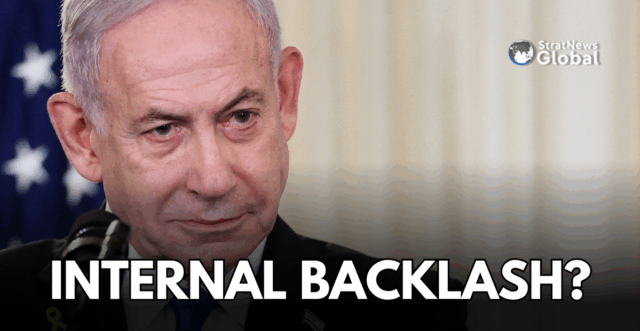A new flashpoint has emerged in Trump’s Gaza plan as Israeli PM Benjamin Netanyahu’s far-right coalition sees a rift. This is likely to derail the U.S. Government’s push to reshape West Asia’s political landscape.
Netanyahu has embraced Trump’s 20-point plan to end the war, which calls for Gaza’s demilitarisation and rules out any future governing role for Hamas. However, allows Hamas members to remain if they renounce violence and surrender their weapons.
This acceptance from Netanyahu is the reason he is facing a severe backlash from ultra-nationalist allies. They are opposing the plan and mounting pressure on it, which could force the PM into early elections in the country.
‘Revived’ Hamas?
Hamas also responded positively, partially accepting Trump’s plan, saying it was ready to negotiate the hostages’ release and would be part of a “Palestinian national framework” as Gaza’s future is addressed.
But the idea that Hamas could still exist, let alone be in a position to continue discussing the Gaza plan after hostages are released, has enraged Netanyahu’s right-wing coalition partners.
“We cannot agree under any circumstances to a scenario in which the terrorist organisation that brought the greatest calamity upon the State of Israel is revived,” said National Security Minister Itamar Ben-Gvir.
“We will in no way be partners to that,” he said in a post on X after the Sabbath, threatening to quit the government.
If far-right ministers quit because Netanyahu has made too many concessions to end the war, his ruling coalition could collapse a full year before the next election, which must be held by October 2026.
However, insisting on more war in Gaza would antagonise the families of hostages still held by Palestinian militants in Gaza. This could also further alienate a war-weary Israeli public as well as Israel’s international allies.
Continued conflict could also extinguish Israeli hopes that more Arab and Muslim states like Saudi Arabia or Indonesia could join the Abraham Accords, a set of U.S.-backed agreements that normalised relations between Israel and several Arab states, leaving Netanyahu in a fix from both ends.
Trump On Gaza
Expanding the Accords has been a priority for Trump as his administration pursues its own interests in the Middle East. Riyadh, however, has made it clear it will not normalise with Israel until the Gaza war ends and there is a path to Palestinian statehood.
Trump has called for Israel to stop bombing Gaza so talks on his plan can play out, starting with indirect negotiations between Israel and Hamas in Egypt’s Red Sea resort of Sharm el-Sheikh on Monday for the release of all remaining hostages.
Netanyahu sees the plan starting with the release of hostages in exchange for Palestinian prisoners. Of the 48 hostages remaining in Gaza, 20 are believed to be alive. A second phase would focus on disarming Hamas and demilitarising Gaza.
But on Saturday, Finance Minister Bezalel Smotrich said that pausing attacks in Gaza was a “grave mistake”. He said that over time this would erode Israel’s position as it pursues its aims of freeing the hostages, eliminating Hamas and carrying out the demilitarisation of Gaza.
Ben-Gvir and Smotrich, whose parties hold 13 of the Knesset’s 120 seats, have long pushed Netanyahu to pursue sweeping, seemingly unattainable goals in Gaza. If both were to leave the government, it would likely trigger an election.
No Gaza Ceasefire Yet
Israeli government spokesperson Shosh Bedrosian told reporters on Sunday that the military had stopped what ‘certain bombings’ but there was no ceasefire in place.
The military would continue to act for “defensive purposes”, she said. Despite Trump’s call to halt the bombing, Israeli strikes on Gaza over the weekend killed dozens of Palestinians.
(with inputs from Reuters)





